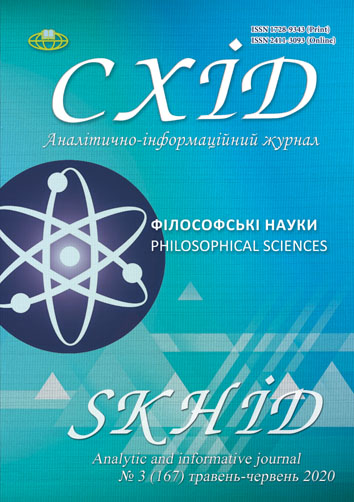On selfness (the “I”) the key to the Universe
DOI:
https://doi.org/10.21847/1728-9343.2020.3(167).206675Keywords:
selfness, universe, Risale-i Nur, the Qur’anAbstract
According to the retrospective analysis of the prominent representatives of European philosophy regarding knowledge and belief, the author suggests that the Universe is a “receptacle” of knowledge about the world, and one source of the knowledge origin is religion. Moreover, he depicts that the source of ideas’ interpretation and new meanings receiving in the Islamic tradition is the collection “Risale-i Nur” written by the Turkish theologian Bediüzzaman Said Nursi. The new distinctive understanding of relations between the Qur’an - the book of “Divine language attribute” and the Universe - the book of “Divine will attribute” is offered in “Risale-i Nur”. Bediüzzaman constantly draws attention to the Universe, demonstrates how “to read” it via the Qur’anic methodology, how to understand the eternal sense any that creation points at, and how to come to the conclusions mentioned in the Qur’an. Analysing the particular volumes of “Risale-i Nur” (namely, “The Words”, “The Letters”, “The Flashes”, “The Rays”), the author highlights originality of Said Nursi’s considerations that are neither similar to the wisdom of the East nor to the science of the West. “Risale-i Nur” is proved to reveal the conceptual meanings and the true values of the Universe by the direct inspiration of the Qur’an and not merely on the real rational deductions. Having accepted knowledge and observations in the light of pages and words from the book of the Universe, Nursi revealed the direct connection between the Qur’an and the Universe. Thus, he proved that there were not any contradictions between them and factually, they were written by the same author. Consequently, when “selfness” (the “I”) is properly involved, it is obvious for a person that the book of the Universe is not different in any way for the revelation. The definitions of Said Nursi exist in four main concepts: one has the sense of the other; every notion contains its definition, intentions and perceptions. When the nature of “selfness” is known and used as described, it offers perceptions that does not reject the products of philosophical and scientific approach and interprets them in the light of revelation, transforming all information into the wisdom. Therefore, the key to deciphering a book of the Universe is in the human nature and its selfness.Downloads
References
Anstey, Peter (2010). ESP is best. In: Early Modern Experimental Philosophy (Project). Retrieved from https://blogs.otago.ac.nz/emxphi/2010/09/esp-is-best/
Campbell, J (1995). The body image and self-consciousness. In J. L. Bermúdez, A.J. Marcel, & N. Eilan (Eds.), The body and the self. The MIT Press, 29-42.
Loeb, Luis E. (1981). From Descartes to Hume: Continental Metaphysics and the Development of Modern Philosophy, Ithaca, Cornell University Press.
Nursi, Bediüzzaman Said (1998). The Flashes [Lem’alar]. Sözler Publications.
Nursi, Bediüzzaman Said (1998). The Letters [Mektubat]. Sözler Publications.
Nursi, Bediüzzaman Said (1998). The Rays [Şualar]. Sözler Publications.
Nursi, Bediüzzaman Said (1998). The Words [Sözler]. Sözler Publications.
Nursi, Bediüzzaman Said (Envar Nesriyat, 1994). Mesnevi-i Nuriye: 230.
Qur’an, 33:72.
Russell, G. A. (Ed.) (1993). The 'Arabick' Interest of the Natural Philosophers in Seventeenth-Century England. Brill: 224-262. DOI: https://doi.org/10.1163/9789004247062
Downloads
Published
How to Cite
Issue
Section
License
Copyright (c) 2020 Bülent Güzel

This work is licensed under a Creative Commons Attribution-NonCommercial-NoDerivatives 4.0 International License.
1. Authors bear responsibility for the accuracy of facts, quotations, numbers and names used.
2. Manuscripts are not sent back.
3. The publisher does not always agree with the authors' opinion.
4. The authors reserve the right to authorship of the work and pass the first publication right of this work to the journal under the terms of a Creative Commons Attribution-NonCommercial-NoDerivatives 4.0 International License. This license allows others to distribute (copy) the published work for non-commercial purposes, provided there is mandatory attribution to its authors and a link to the first publication in our journal.
5. The authors have the right to conclude separate supplement agreements that relate to non-exclusive work distribution in the form in which it has been published by the journal (for example, to upload the work to the online storage of the journal or publish it as part of a monograph), provided that the reference to the first publication of the work in this journal is included.

